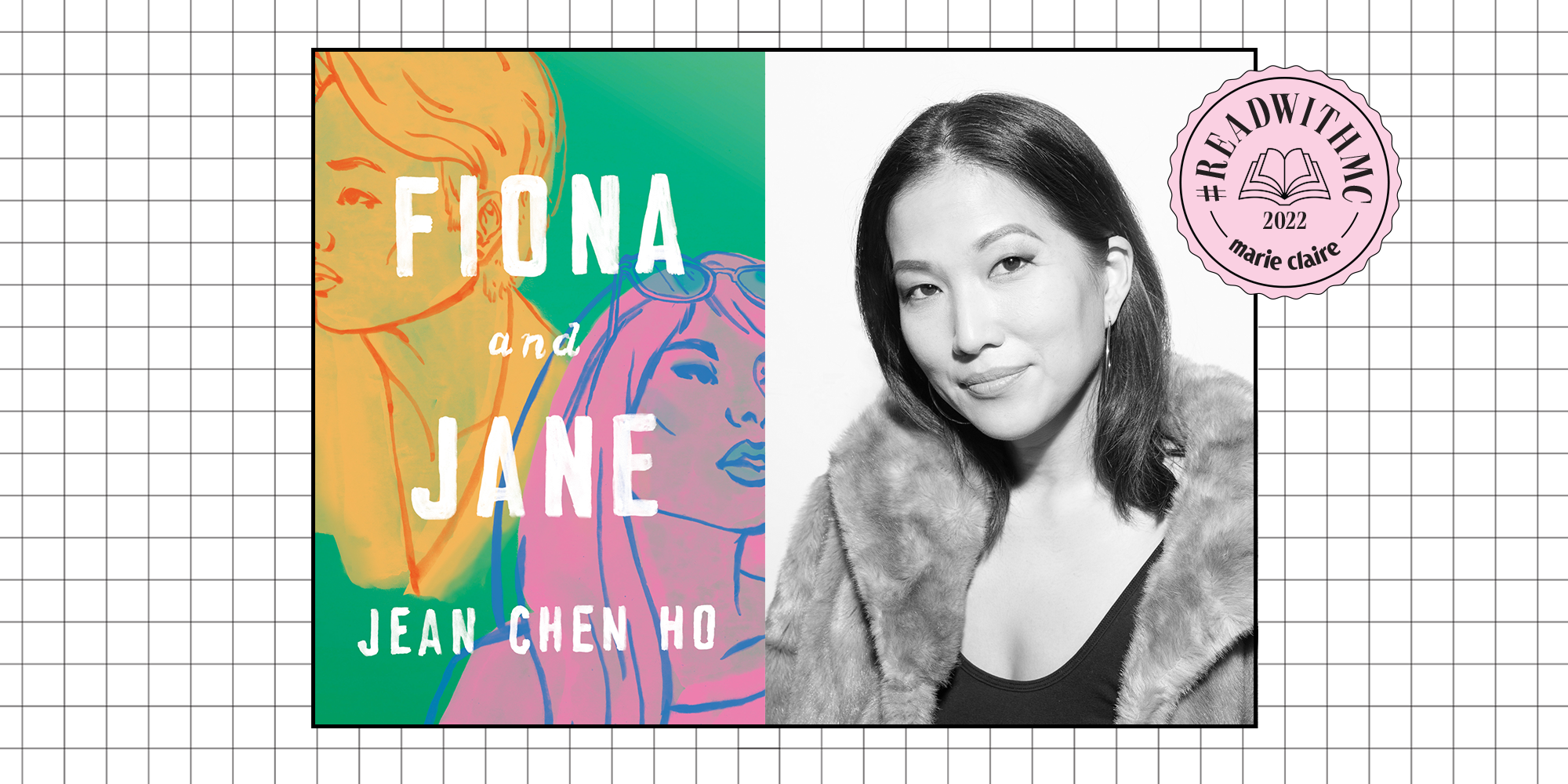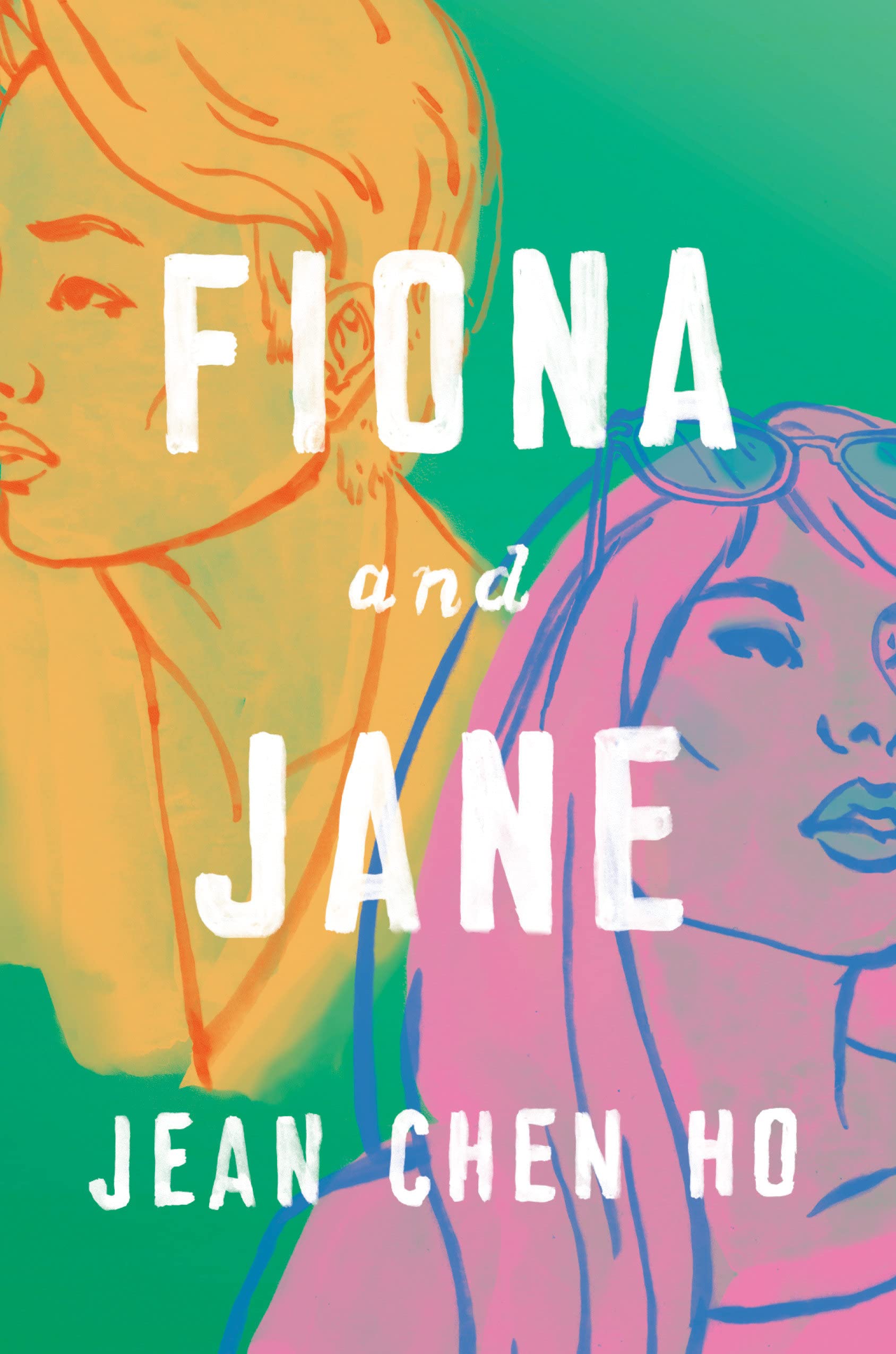'Fiona and Jane' Is Our January Book Club Pick
Read an excerpt from Jean Chen Ho's debut novel, here, then dive in with us throughout the month.

Welcome to #ReadWithMC—Marie Claire's virtual book club. It's nice to have you! In January, we're reading Jean Chen Ho's Fiona and Jane (out January 4), a novel that explores the evolving friendship between two Taiwanese American women over the course of two decades. Read an excerpt from the novel below, then find out how to participate in our virtual book club here. (You really don't have to leave your couch!)
The year we turned sixteen, Fiona decided it was time we learned to drink. We drove to the Norwalk swap meet and laid out fifty bucks each for fake IDs from a passport photo, faxing, and color copy stall. A Gujarati family owned the business, and the girl we paid off had graduated from our high school a few years back. When she handed us the finished IDs, we knew right away we’d been scammed. They were flimsy laminated jobs no better than Blockbuster membership cards, overexposed photos of our unsmiling faces glued onto a rectangle of white paper with California Identification Card typed across the top, our names and birthdays below, minus those crucial five years to age us up to twenty-one. We were too embarrassed to demand our money back. Still, we were eager to test them out. That was when we called Won. He said he knew a place, and the three of us set out one Saturday night in Shamu, Fiona’s hatchback she named after the Sea World killer whale because of the corroding white patches all over the black paint.
The freeway glowed with stop-and-go brake lights. We barely moved: no more than ten, twelve, fifteen miles an hour. Seven thirty at night, the sky was a washed-out indigo, a few dirty gray wisps hanging low. No doubt Shamu was a hoopty, but she was ours. Well, she was Fiona’s. Which meant she was mine, too. We were best friends; we shared everything.
Won leaned forward from the back seat. “Lucky this place doesn’t card,” he said. “You guys are dumb if you think those janky IDs will get you anywhere.”
“Put on your seat belt before I get a ticket,” Fiona said.
Won told her the name of the exit, somewhere off the 5 in Garden Grove. He was taking us to a “sooljip,” he called it.
“Trust me,” Won said. “It’s gonna work out. Just be cool. You hear that, Jane?”
Get exclusive access to fashion and beauty trends, hot-off-the-press celebrity news, and more.
“Shut up,” I said. “I can be cool—”
“Behind there—it’s that place in the corner.”
I looked out the windshield to where Won was pointing.
Fiona steered into the parking lot of a strip mall. She hesitated. “Should I—Right in front?”
Between a brightly lit twenty-four-hour donut shop and a dry cleaners with its pleated metal shutter pulled down for the night, there stood an unmarked storefront with a row of large windows, the glass tinted black. You couldn’t see inside at all. A neon sign buzzed red in one of the darkened panes, something spelled out in Korean characters.
I exchanged a quick glance with Fiona before we climbed out of Shamu. I could see the excitement in her eyes, and that she was trying to hide it.
We trailed in behind Won and sat down at a booth. The place looked nothing like the bars I’d seen on TV. First of all, there was no bar to speak of, no bartender standing behind a long countertop lined with stools. There were tables and chairs and booths, just like at a restaurant, except the lights were dimmed. I smelled fry oil and garlic in the air, and some cleaning agent, a chemical scent like a chlorine, but covered by citrus. The walls were papered in newsprint comic strips and glossy magazine ads that people had tagged over with black Sharpie markers in English and Korean.
When the waiter approached, Won did all the talking. His voice sounded different in Korean. Harder, somehow, like stone striking stone. The waiter, unsmiling, tipped his head toward Fiona and me. The name tag pinned to his black button-down shirt read sung. A raised pink scar stretched from his left ear to his chin, where a thin patch of short black hairs sprouted. I noticed Fiona watching him. Won answered him, and the waiter nodded, then backed away.
“What’d he say?” I asked.
“It’s cool,” said Won.
“Should we show him our IDs?”
Won just shook his head and laughed. A minute later, the waiter materialized with a tall pitcher of beer and three frosted mugs on a tray. We fell into a nervous silence as he placed everything on the table. Soon as he walked off, Fiona and I looked at each other and busted up laughing.
Won poured out three glasses. My first taste of beer nearly made me gag. I sipped slowly, trying to get used to the bitter taste, the bubbles burning down my throat. Half a glass in, I felt heady, my face warm to the touch.
Shoplifting came easy to him, Won said, because mall security was always too busy hassling the Black kids to notice a skinny Asian redeeming his five-finger discount.
“You like it?” Won said. “This is nice, right?”
A loud burp escaped Fiona’s throat, and she clapped a hand over her mouth.
“I don’t know how I feel,” I replied honestly. “Is this drunk? Am I?” Won refilled my glass.
“Won, I love you,” Fiona said. He grunted. “No, really,” she said earnestly. “I love you.” She turned to me. “And, Jane, I love you, too. I love you the most.”
“This one turns into a happy ass.” Won looked as pleased as I’d ever seen him. “What about you?”
“Jane,” said Fiona from across the table. “Girl, you okay?”
“I love you, too,” I said.
“Oh shit,” Won said. “You’re one of those depressed drunks.”
“What?” I said. “No I’m not.”
“Two types,” Won said knowingly. “You’re not going to start crying, are you?”
“The waiter,” Fiona said. “He’s kind of cute.”
“Him?” Won said. “You got on beer goggles.”
“I do?” Fiona said. “What’s that?” Then she laughed again.
Fiona, Won, and I have been friends since second grade, Miss King’s class. Same junior high and same high school, too, until Won got tossed last year, when we were sophomores. He was already on probation for ditching, a couple of fights, some other stuff. Then one day last April this football player, a big Samoan dude, decided to punk him for no good reason.
Won had the kind of face that summoned bullies like flies to dog shit. They thought he was stuck up because of the Boyz II Men–inspired cable-knit sweaters; preppy button-down shirts; and cuffed chinos he wore when everyone else sported white tube socks with Adidas slides, size forty waist jeans, and XXL Fruit of the Loom tees. People called him “Pretty Boy” and “Richie Rich,” and they didn’t mean it like a compliment, either.
Fetu toed up at lunchtime and said he heard Won was talking trash about his girl. Not only did Won suffer the humiliation of getting his ass beat in front of everyone in the quad, our evil vice principal decided it was the last straw for Won’s disciplinary offenses and kicked him out (nothing happened to Fetu; he was a senior with two months left and was untouchable anyway because of his rushing yards average). Won got sent down to the continuation school with the druggies, pregnant girls, and gangbangers. Last stop before dropping out, juvie, or deportation.
Won wasn’t who people thought he was, though. He wasn’t some spoiled fuckup with a dad who owned a chain of liquor stores or gas stations or SAT cram schools. We knew other Koreans like that, sure. But Won ganked all his fancy clothes. Shoplifting came easy to him, Won said, because mall security was always too busy hassling the Black kids to notice a skinny Asian redeeming his five-finger discount. For years he’d used a fake address to go to school with us, a better district than the one in his zip code.
Most of the boys we knew from school were Neanderthals with pimples, drenched in Cool Water cologne. Won wasn’t like them. He was different. We felt safe with him. Fiona and I would never actually tell him to his face, but Won was all right by us.
From Fiona and Jane by Jean Chen Ho, published by Viking, an imprint of Penguin Publishing Group, a division of Penguin Random House, LLC. Copyright (c) 2022 by Jean Chen Ho.
Dedicated to women of power, purpose, and style, Marie Claire is committed to celebrating the richness and scope of women's lives. Reaching millions of women every month, Marie Claire is an internationally recognized destination for celebrity news, fashion trends, beauty recommendations, and renowned investigative packages.
